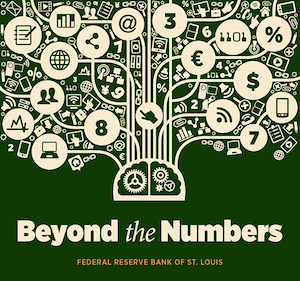
On November 18-20 this year, the St. Louis Fed will host three virtual presentations in place of its biennial conference Beyond the Numbers. Since 2014, the conference has brought together expert speakers and presentations to address the challenges of economic information. The aim of the conference, “to provide librarians and other information professionals with the knowledge, competence, and enthusiasm to disseminate economic information expertise to their respective audiences,” expresses a mission echoed in FRASER’s values and supported by its collections.
The 2020 sessions will feature three speakers across three days. The first day will be tailored toward those interested in promoting data literacy skills with students, with a presentation by Charles Hokayem, an administrator at the Kentucky Research Data Center, and John Perry, an associate professor at Centre College. Hokayem and Perry’s presentation, “Discovering Data Sources Through the Dataset Presentation,” addresses the challenge of acquainting students with major data sources. FRASER addresses this challenge with its “Teaching and Learning with FRASER” collection, which includes several lessons on data literacy that combine primary and secondary sources to introduce students to the concepts of data reliability, using charts to provide graphical views of data, and data analysis.
William Beach, current Commissioner of the Bureau of Labor Statistics (BLS), will present on November 19 on the history, present, and future of the consumer price index (CPI), one of the principle economic indicators produced by the BLS. Those interested in the history of price fluctuations and their effect on the economy will find rich details in FRASER’s robust collection of historical CPI materials, including a collection of the CPI Detailed Report from 1953-2017 and a collection of Bulletins produced by the BLS over the past century, with data related to trends in consumer prices; the history and techniques of the CPI; and the consumer expenditure survey, from which the CPI draws its sample weights. Beach will also present a timely analysis of how the CPI index has been affected by the COVID-19 pandemic.
The third and final presentation of the conference will feature Lars Vilhuber, economist at Cornell University and Data Editor for the American Economic Association. He will outline best practices in data citation. Data citation is similar to the citation of publications, something librarians know well. The economic data resources of the St. Louis Fed strive to provide proper attribution and credit, be it a traditional publication in FRASER or a dataset from the St. Louis Fed FRED® or ALFRED® data services. FRED®, a source for economic data presented via an interactive data tool, and ALFRED®, an interactive repository of vintage economic data, rely on trusted data sources for their nearly 800,000 series. As an aggregator of historical economic materials, FRASER holds a wide collection of economic data publications, including the statistical releases of the Federal Reserve, one of FRASER’s largest collections. All of these resources include source information, title and series details, dates of creation and access, and a suggested citation for each item.
Beyond the Numbers provides an excellent opportunity for information professionals to deepen their understanding of the challenges and potential in sharing and using economic data and information. This year’s virtual offerings, with expert presenters and up-to-date topics, remain on the forefront of the discussion. Through support for conferences like this one and other projects (such as interpreting economic data with sentiment analysis and ongoing work to develop a RESTful API), the FRASER team continues to fulfill its mission to assist researchers, librarians, and educators in finding, using, and understanding economic data.
To learn more about Beyond the Numbers, visit the 2020 event website, or view presentations from past years.
© 2020, Federal Reserve Bank of St. Louis. The views expressed are those of the author(s) and do not necessarily reflect official positions of the Federal Reserve Bank of St. Louis or the Federal Reserve System.
